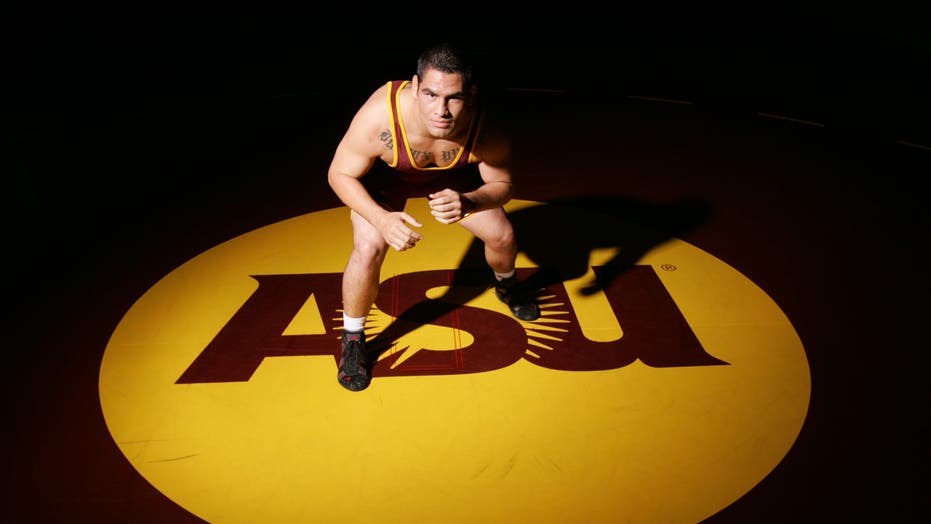Collegiate wrestling isn’t for the faint of heart.
It takes a certain toughness, skill, and dedication to make it to the top of a division or even to survive the season.
Arizona State University, where a large number of the athletes in the wrestling program are Latino, a tradition has been built to produce some of the toughest and most resilient athletes in the country.
Bill Rosado was one of the original Sunkist Kids, a wrestling club founded by Arthur J. Martori to promote the sport. Martori, a former ASU wrestler, started the non-profit club to sponsor and promote wrestling.
Rosado, who is Puerto Rican, moved to Arizona with his family during high school and was the first Arizonan to make the Olympic wrestling team. In 1976, he represented his country in the Montreal Olympics and was an All-American at ASU.
“If you’re a wrestler, you can learn the elements you need to become anything,” said Rosado.
Now a businessman in Las Vegas, Rosado considers himself an ambassador for the sport and ASU wrestling.
“Anything we do that takes us to the top of our chosen path… is always an advocacy for our sport or what we did,” said Rosado. “I wouldn’t be where I am today if not for competing in this sport.”
Long considered one of the elite wrestling programs in the country, Arizona State has produced some of the most feared and inspiring wrestlers in the country.
In 2011, Anthony Robles won a national championship for Arizona State by going undefeated and winning the national tournament at 125 pounds in his final year of eligibility.
Robles’ story seems common in ASU wrestling lore except there is one distinctive difference between him and other wrestlers – he was born with one leg.
“They gave me the opportunity to prove myself and earn a wrestling championship,” said Robles, now a motivational speaker. “Other schools doubted my ability to compete.”
Robles graduated from Mesa High School as a state champion. But, because of his disability, was not offered academic or sports scholarships.
According to Robles, ASU gave him the opportunity to earn a scholarship.
“ASU was the only school offering any chance for academic scholarship help,” said Robles.
Roble wrote a book about his journey and currently is working on turning his life story into a movie.
“The program taught me hard work, discipline,” said Robles. “When you’re on the mat it’s just you and one other guy. Nobody could help me and that transformed my life.”
When you’re on the mat it’s just you and one other guy. Nobody could help me and that transferred to my life.
Robles and Rosado are just two names in the long Latino history of ASU wrestling.
Eddie Ortiz, Thom Ortiz, Eddie Urbano, Kelly Trujillo and Joe Romero were all Latino All-American wrestlers at ASU, the majority of them products of the Arizona desert.
“They’re observant. They try to keep and try to reap the talent from the state..,” said Rosado. “They have tried to carry on that tradition and tried to keep its talent in Arizona.”
Brian Stith wrestled for ASU and has been an assistant coach for the team since his graduation in 2007.
“I think the location and then you got the only Division I program in Arizona is why we get a lot of Latinos,” said Stith. “You have to be tough or become tough to make it in this program.”
In addition to Robles, UFC heavyweight champion Cain Velasquez has become one of the most prominent of recent ASU talent to represent the Sun Devils post graduation.
Just last month, he recaptured the UFC heavyweight championship. At ASU, he was an All-American.
In recent years, the program has produced more wrestlers who have decided to take up mixed martial arts.
Ryan Bader, C.B. Dolloway and John Moraga (who in college went by the name John Espinoza) all wrestled at ASU and are now UFC fighters. In the past UFC legend Dan Severn wrestled collegiately at ASU.
“I grew up during my time at ASU,” said Moraga. “It taught me about discipline and it gives better odds for Latinos to make a name for themselves.”
“They have produced a lot of fighters. A lot of the great ones,” said Velasquez. “It definitely does take a toll on your body and your mind gets strong from that.”
For many of these ASU wrestlers their Latino heritage is what separates them from the pack.
“The Hispanic community works very hard and they’re willing to give it their all like nobody else can,” said Rosado.
Follow Victor Garcia on Twitter @MrVicGarcia.
Follow us on twitter.com/foxnewslatino

